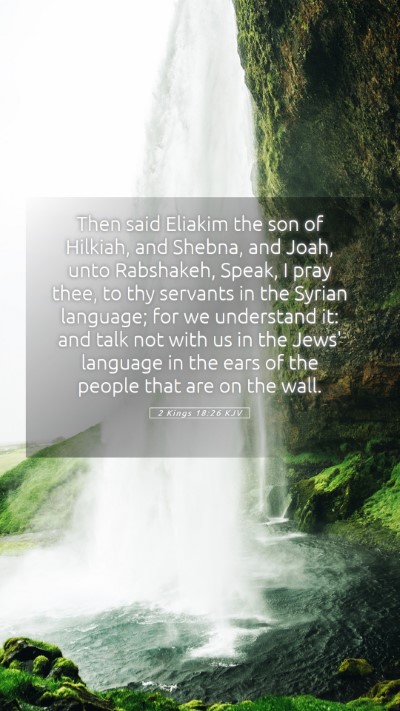Understanding 2 Kings 18:26
In this verse, 2 Kings 18:26, we see the Assyrian representative addressing the people of Judah. He challenges them to consider the trust they place in their king and God. This moment is pivotal in the context of the heightened conflict between Assyria and Judah during King Hezekiah's reign.
Verse Text
"Then said Eliakim the son of Hilkiah, and Shebna, and Joah, unto Rabshakeh, Speak, I pray thee, to thy servants in the Syrian language; for we understand it: and talk not with us in the Jews’ language in the ears of the people that are on the wall."
Verse Meaning
The request to speak in the Syrian language, rather than in Hebrew, reveals the leaders' concern for the morale of the people. If the Assyrian envoy speaks directly to the people on the wall in their own language, it could incite fear and panic among them.
Insights from Commentaries
-
Matthew Henry:
Henry highlights that the Assyrian's intimidation tactics involved using their own language to instill fear. Eliakim and the others were aware that speaking in Hebrew would echo their defeat among the people, and therefore chose to protect them from such discouragement.
-
Albert Barnes:
Barnes elaborates on the political implications of the conversation. He notes the strategic choice in language as an act of diplomacy and a method to manage the situation, ensuring the people didn't "lose heart" during this crucial moment.
-
Adam Clarke:
Clarke points out the symbolism of communication and understanding in this exchange. The leaders' request showcases their desire for control over the narrative and the careful handling of fears among the populace, reflecting the importance of maintaining faith and confidence amidst adversity.
Application and Reflection
In applying this scripture to daily life, one can reflect on the importance of communication and the responsibility that leaders have to maintain morale and unity within their communities. It beckons a deeper question of how we manage discourse in crises and the potential ramifications of our words.
Cross References
- Isaiah 36:11-13: The context of the encounter between the Assyrians and Judah.
- 2 Kings 19:9: Hezekiah’s response to distress and the trust in God's deliverance.
- Psalm 46:1: A reminder that God is a refuge and strength in times of trouble.
Conclusion
In summary, 2 Kings 18:26 serves as a profound reminder of leadership, communication, and the impact of language in times of turmoil. By studying the verse in depth, we grasp greater biblical insights and the essence of human interactions during crises.


